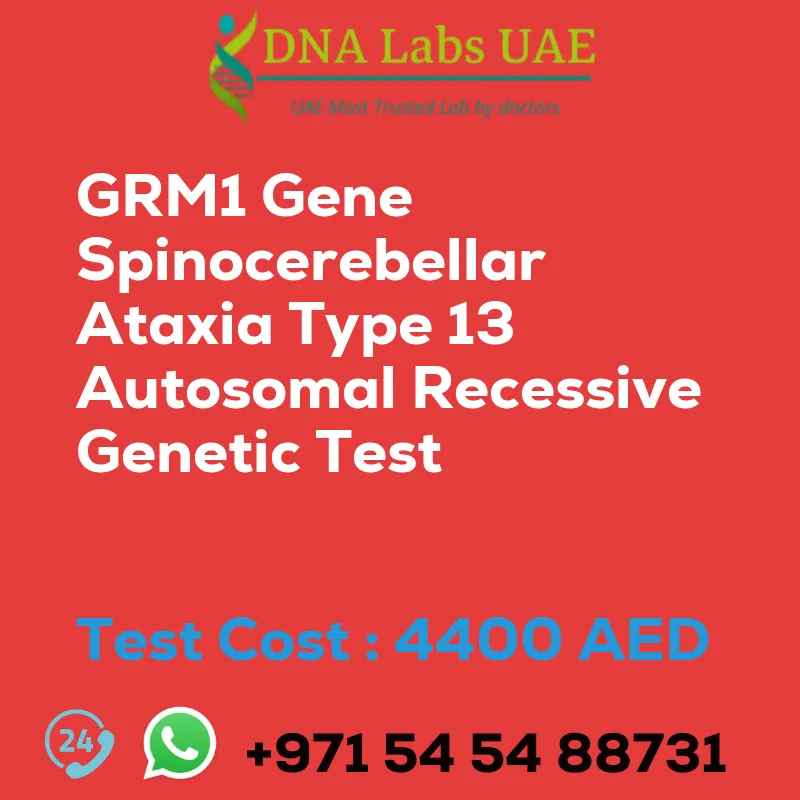GRM1 Gene Spinocerebellar Ataxia Type 13 Autosomal Recessive Genetic Test
Are you or your loved one experiencing progressive problems with movement and coordination? DNA Labs UAE offers the GRM1 Gene Spinocerebellar Ataxia Type 13 Autosomal Recessive Genetic Test to help diagnose this rare genetic disorder.
Test Components and Price
The test costs AED 4400.0 and requires a blood or extracted DNA sample. Alternatively, one drop of blood on an FTA Card can also be used.
Report Delivery
After the sample is received, the report will be delivered within 3 to 4 weeks.
Method
The GRM1 Gene Spinocerebellar Ataxia Type 13 Autosomal Recessive Genetic Test utilizes NGS (Next-Generation Sequencing) technology.
Test Type and Doctor
This test is specifically designed for the diagnosis of neurological disorders, and it is recommended to consult with a neurologist.
Test Department
The test is conducted in the Genetics department of DNA Labs UAE.
Pre Test Information
Prior to the test, it is important to provide the clinical history of the patient. Additionally, a genetic counseling session will be conducted to draw a pedigree chart of family members affected by GRM1 Gene Spinocerebellar Ataxia Type 13 Autosomal Recessive.
Test Details
Spinocerebellar Ataxia Type 13 (SCA13) is a rare genetic disorder characterized by progressive problems with movement and coordination. It is caused by mutations in the GRM1 gene, which is responsible for producing a protein called metabotropic glutamate receptor 1 (mGluR1). In order for an individual to develop SCA13, both copies of the GRM1 gene must be mutated, making it an autosomal recessive disorder.
The GRM1 Gene Spinocerebellar Ataxia Type 13 Autosomal Recessive Genetic Test uses NGS technology to analyze multiple genes simultaneously and identify mutations or variants that may be responsible for the disorder. By sequencing the GRM1 gene, this test provides a definitive diagnosis of SCA13 in individuals displaying symptoms consistent with the disorder. It can also be used for carrier testing in individuals with a family history of SCA13 to identify those who have one mutated copy of the GRM1 gene but do not exhibit symptoms.
It is crucial to undergo genetic testing for SCA13 under the guidance of a healthcare professional or genetic counselor. They can provide the necessary counseling and support before and after the test.
Don’t let the uncertainty continue. Take the first step towards a definitive diagnosis with the GRM1 Gene Spinocerebellar Ataxia Type 13 Autosomal Recessive Genetic Test offered by DNA Labs UAE.
| Test Name | GRM1 Gene Spinocerebellar ataxia type 13 autosomal recessive Genetic Test |
|---|---|
| Components | |
| Price | 4400.0 AED |
| Sample Condition | Blood or Extracted DNA or One drop Blood on FTA Card o |
| Report Delivery | 3 to 4 Weeks |
| Method | NGS Technology |
| Test type | Neurological Disorders |
| Doctor | Neurologist |
| Test Department: | Genetics |
| Pre Test Information | Clinical History of Patient who is going for GRM1 Gene Spinocerebellar ataxia type 13, autosomal recessive NGS Genetic DNA Test A Genetic Counselling session to draw a pedigree chart of family members affected with GRM1 Gene Spinocerebellar ataxia type 13, autosomal recessive |
| Test Details |
Spinocerebellar ataxia type 13 (SCA13) is a rare genetic disorder characterized by progressive problems with movement and coordination. It is caused by mutations in the GRM1 gene, which provides instructions for making a protein called metabotropic glutamate receptor 1 (mGluR1). Autosomal recessive means that both copies of the GRM1 gene must be mutated for an individual to develop SCA13. This means that an affected individual must inherit one mutated copy of the gene from each parent. Next-generation sequencing (NGS) genetic testing is a method used to analyze multiple genes simultaneously and identify mutations that may be responsible for a particular genetic disorder. In the case of SCA13, an NGS genetic test can be used to sequence the GRM1 gene and identify any mutations or variants that may be present. The purpose of the test is to provide a definitive diagnosis of SCA13 in individuals who have symptoms consistent with the disorder. It can also be used for carrier testing in individuals with a family history of SCA13, as it can identify individuals who have one mutated copy of the GRM1 gene but do not show symptoms of the disorder. It is important to note that genetic testing for SCA13 should be done under the guidance of a healthcare professional or genetic counselor, as they can provide appropriate counseling and support before and after the test. |








